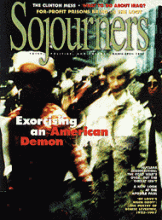This is history in the making, and I am both moved and appalled at the spectacle unfolding before me. Has it been too neatly choreographed for public consumption? Why is it that the world pays so much attention to the murder of an American, while the deaths of thousands of South Africans remain tucked away on the back pages of history?
Amy Biehl was an exchange student, stabbed and stoned to death in August 1993 by a mob in the township of Guguletu, just two days before she was to return home to the United States. Four young men, members of the youth organization of the Pan Africanist Congress (PAC), were convicted of the murder. This is the day of their amnesty hearing.
The young men appear frightened as they are led into the hearing room. The Biehls have publicly offered them forgiveness and stated that they will support the Truth and Reconciliation Commission if it decides to grant them amnesty.
THE AMNESTY HEARINGS are perhaps the most controversial aspect of the Truth and Reconciliation Commission (TRC). The vast number of the more than 7,000 applicants for amnesty are white police officers and others who have been convicted of the brutal crimes of apartheid. During the negotiations that led to the transfer of power from F.W. de Klerk's NP (National Party) to Nelson Mandela's ANC (African National Congress), NP leaders pushed for blanket amnesty; in other words, those who tortured and murdered were not to be held accountable for their crimes.
Read the Full Article
